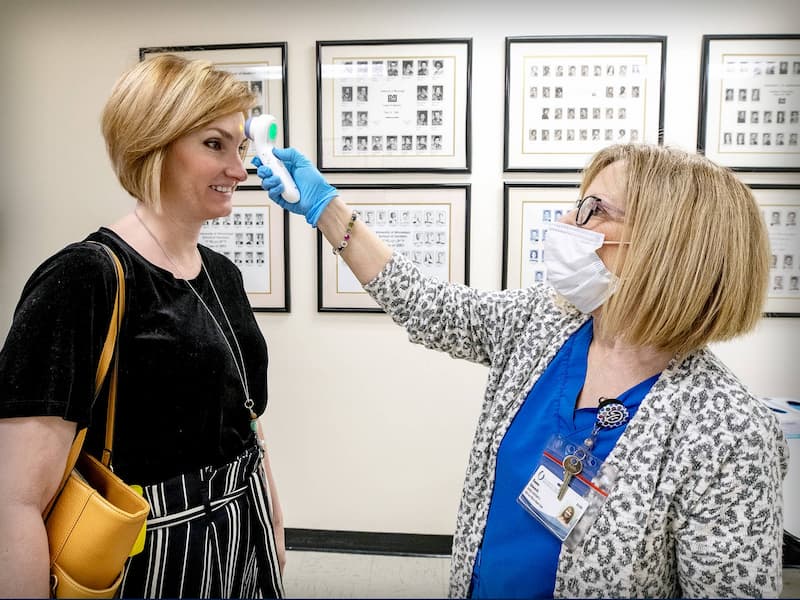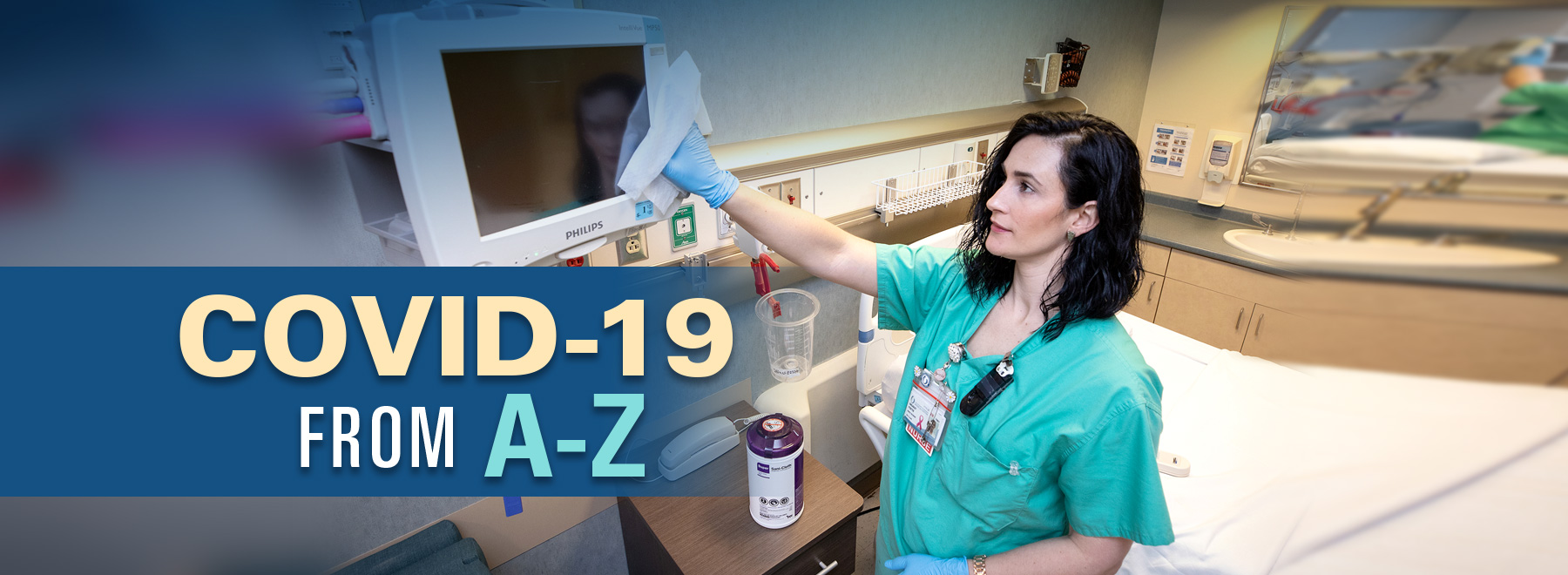UMMC releases abbreviated guide to life in the time of COVID-19

The below article appears in CONSULT, UMMC’s monthly e-newsletter sharing news about cutting-edge clinical and health science education advances and innovative biomedical research at the Medical Center and giving you tips and suggestions on how you and the people you love can live a healthier life. Click here and enter your email address to receive CONSULT free of charge. You may cancel at any time.
The Mississippi onset of COVID-19, the disease caused by the novel coronavirus that has been declared a global pandemic, means life as we knew it a couple of months ago has now changed indefinitely.
The University of Mississippi Medical Center, the state’s only academic health sciences center, is highly prepared for the health challenges of COVID-19 and is working around the clock to ensure proper care for those in need of screening, isolation and treatment. Although no one with a confirmed case of COVID-19 was a patient at the Medical Center as of March 16, the progression of the disease in communities nationwide and globally is rapidly changing.
On March 11, the Mississippi State Department of Health reported the state’s first positive case of COVID-19, a Forrest County man who recently traveled to Florida. The patient voluntarily isolated himself at home to prevent further transmission to others and wasn’t hospitalized.
Eleven more cases have since been identified as of March 16. Among them: a Forrest County woman over 65 who recently traveled to North Carolina and was hospitalized; a Forrest County man who recently traveled to Florida and is home self-isolating and didn’t require hospitalization; a Leflore County woman who is home self-isolating and didn’t require hospitalization; a Pearl River woman over 65 who was hospitalized; and a Copiah County woman over 65 who was hospitalized.
MSDH reported four of those cases on March 15 and two more March 16. Overall, the 12 cases included three in Forrest County, three in Pearl River County, two in Hinds County, two in Copiah County, one in Leflore County and one in Monroe County.
The Hinds County cases are two students, a Jackson State University student and a UMMC student. Both are self-isolating at home. The UMMC student did not return to campus after the student’s diagnosis during spring break.
Aside from the specter of being infected by the virus, adapting to ramped-up infection control, the cancellation of favorite events and taking part in “social isolation” is the “new norm.” Mississippi Gov. Tate Reeves has declared a state of emergency and urged schools to stay closed through March 20 and people to work from home, if possible.
UMMC’s infection prevention experts, doctors, nurses and clinical staff have taken measures to protect employees, students, patients and families – but Mississippians, especially those over 60 who are most at risk, must take personal steps to stay healthy.
The Medical Center is partnering with MSDH and the U.S. Centers for Disease Control and Prevention to bring the most up-to-date information to Mississippi communities so residents can make their best decisions on prevention and continue making necessary changes to their day-to-day lifestyles.
Some helpful links:
Keep up with the Medical Center’s preparations and protocols for suspected and confirmed COVID-19 cases here.
Information from the MSDH on the public health aspects of COVID-19 and recommendations on keeping safe can be found here.
Find out the CDC’s plans to mitigate COVID-19 and recommendations on keeping workplaces, homes, schools and businesses safe here.
Go here to keep up with the global and national COVID-19 numbers and progression.
Check key facts about COVID-19 and help stop the spread of rumors here.
Here are some highlights of what Mississippians need to know for the weeks ahead:
Diagnosis of COVID-19
Guidelines from the U.S. Centers for Disease Control and Prevention on who should be screened are changing and may continue to change.
Screenings will take place on someone experiencing fever and signs/symptoms of lower respiratory illness (cough, shortness of breath), and, in the last 14 days before symptoms appeared, had either a history of travel from any of five geographical areas outside the United States: China, Japan, South Korea, Italy and Iran; or close contact with a laboratory-confirmed COVID-19 patient.
In addition, given the increased evidence of community spread within the United States, CDC updated its guidelines to say a physician's suspicion of COVID-19 is sufficient indication for testing what appears to be a milder case not requiring hospitalization. They will base this on the local outbreak situation and evaluation of those with severe respiratory illness of unclear origin.

“Most acute care hospitals in the state are prepared to receive COVID-19 patients, including screening, isolation and care as needed,” said Dr. Jonathan Wilson, UMMC chief administrative officer. “Unlike the Ebola crisis of a few years ago, COVID-19 patients do not receive added benefit from a higher level of care offered by tertiary medical centers, meaning those that treat more severe conditions requiring specialized knowledge and more intensive health monitoring.”
“If you believe that you could have COVID-19 based on your symptoms, you can be screened and give samples for testing by going to an urgent care clinic or your physician’s office,” said Dr. Bhagyashri Navalkele, assistant professor in UMMC’s Division of Infectious Diseases and medical director of Infection Prevention. “However, you are asked to CALL AHEAD of your arrival to give staff time to take steps to protect patients and employees from possible exposure.

“It is not necessary to go to UMMC’s Emergency Department, or any Mississippi hospital ER, unless you are having a true emergency, such as difficulty breathing,” Navalkele said. “It’s important to keep emergency rooms available for critical care of those who aren’t possible COVID-19 patients.”
For the most recent CDC guidelines on screening, click here.
Who provides testing for COVID-19 and how
The Mississippi State Department of Health is providing most testing for Mississippians. They use special test kits to examine bodily specimens submitted by health care professions from hospitals and clinics to determine if a person is positive, and they send the testing materials to the CDC for a second check.
The test can rule out COVID-19 in patients who might instead have flu, a different coronavirus, or a bad cold with symptoms that can mimic COVID-19.
Physicians can now submit specimens to MSDH or a private commercial lab without first consulting MSDH staff. That will streamline necessary testing. You and your health care provider can discuss whether testing is appropriate in your situation based on your symptoms and likelihood of contact with someone who has the disease.
Call the MSDH COVID-19 hotline to ask questions about testing at (877) 978-6453, Monday-Friday from 8 a.m.-5 p.m.
Difference between COVID-19 and the flu or a cold
The CDC advises people consider these sets of symptoms in evaluating what illness they might have. Itchy eyes, stuffy nose and sneezing are symptoms of a cold or allergies. Fever, fatigue, body aches, cough and worsening symptoms can be the flu or COVID-19. Adding shortness of breath, a travel history and exposure to someone with COVID-19 could mean you have COVID-19.
However, symptoms and risks vary from person to person, so always check with your doctor.
Learn more about how and why COVID-19 differs from the flu and the common cold from former CDC Director Dr. Tom Frieden here.
Protecting yourself from COVID-19
Many of the same common-sense precautions against seasonal influenza should be followed for COVID-19.
COVID-19 is spread by droplets created by coughing or sneezing, the same way the flu is spread. Someone can inhale the droplets and be infected, or touch their eyes, nose or mouth with fingers that have been exposed to droplets. Spread can also occur from touching a contaminated surface and introducing the virus into your nose, eyes or mouth.
It’s considered highly contagious, although how easily a virus spreads person to person can vary. The CDC offers constantly updating information about the disease here as it becomes available in a rapidly evolving situation.
“First and foremost, wash your hands properly and often – with soap and water for at least 20 seconds,” Navalkele said. “Find the best and most effective technique here. If that’s not available, use an alcohol-based hand sanitizer. Avoid touching your eyes, nose and mouth with unwashed hands; learn how to best sanitize your work area or household here.”
Avoid close contact with a sick person, especially those coughing or sneezing. Close contact with a sick person is the most common mode of transmission of viral illnesses, including COVID-19. In view of widespread cases in the world and across some states, adapt some no-touch greeting methods, such as a fist bump, elbow bump, nod/wave, or a smile.
Stay home from work or school if possible, and refrain from going into the public, if you’re sick, whether or not you have a confirmed COVID-19 case. Cover your cough or sneeze with a tissue, then throw the tissue in the trash. Clean and disinfect frequently touched objects and surfaces.
If you haven’t gotten your annual influenza shot, get it now because flu is very prevalent in the state. It won’t prevent COVID-19 or lessen its effects, but a flu vaccination can prevent the flu or make it less severe, and decrease your chance of hospitalization and death. It also keeps you healthier and better able to fight off infections.
Should I wear a mask, gloves or other protection in public?
“If you are well, you don’t need to wear personal protective equipment, or PPE,” Wilson said. “The national shortage of medical supplies and PPE continues because some of those who don’t need protection are buying it up or taking it, potentially leaving front-line hospital caregivers and patients without. They are the only ones who need to wear gear designed to block droplets released into the air by someone who coughs or sneezes.”
The Medical Center has adequate medical supplies for use in an outbreak, but UMMC has taken steps to discourage employees, patients and patient families from taking PPE home with them so that enough will be on hand for those who need it.
Find out more about how COVID-19 spreads in public places and how to protect yourself here.
Social isolation and mass gatherings
The MSDH recommends that individuals, communities and organizations take a hard look at whether to cancel “mass gatherings” such as concerts, fundraisers, sporting events and other activities attracting large crowds. The department recommends staying informed of cases in your vicinity and maintaining social distancing as practical.
The CDC revised its guidelines Sunday, recommending organizers cancel or postpone events with 50 people or more for the next eight weeks. "Large events and mass gatherings can contribute to the spread of COVID-19 in the United States via travelers who attend these events and introduce the virus to new communities," the agency said.
The recommendations are especially for those ages 65 or older OR have a chronic medical condition. People at high risk for serious illness from COVID-19 are older adults, the very young, and those with a chronic illness such as heart disease, diabetes, or lung disease.
If you do attend a mass gathering, remember to practice hygiene and distancing steps, which is keeping six feet if possible between you and others, especially if you are at high risk. Those most at risk who go out in public should keep away from others who are sick, limit close contact with all individuals, and wash hands often, especially after leaving a public place.
Contact the MSDH at 1-877-978-6453 for help in determining whether cancelation of your event is warranted, or what appropriate protective steps to take for your event if it’s not canceled. The CDC offers tips for avoiding infection in large gatherings here.
School and university closings
Mississippi’s public universities are extending their spring break through the week of March 16-20, and then conducting classes online instead of on campus until further notice. Students are encouraged to return home during that period.
Several UMMC schools have announced changes to their schedules, and all student clinical rotations have been suspended through March 29.School-specific information is being sent directly to associated faculty and students.
Mississippi’s community colleges operate independently on decisions as to transition to online courses or extend spring break. Check with your local community college on its plans. The state Board for Community and Junior Colleges shut down all athletic events through March 30.
The MSDH recommends that schools statewide consider canceling any mass gatherings, such as assemblies, sporting events and social events. The Mississippi Department of Education is frequently updating information about COVID-19 in the school communities here.
The CDC offers advice to schools and daycares to prevent or limit the spread of viral illnesses here. CDC tips for colleges and universities can be found here.
Long-term care facilities
Mississippi’s nursing homes, retirement communities and other long-term care facilities are home to some of the state’s most medically vulnerable residents. The MSDH recommends limiting or otherwise restricting visitation to family members, and those visitors should not have contact with non-family residents because they can spread the virus to them.
MSDH also recommends limiting visits by children and the elderly, or those with underlying medical conditions that could place them and facility residents at risk. If a visitor is ill, they should stay away from the facility for at least 48 hours after their symptoms subside.
MSDH encourages long-term care facilities to discontinue their group activities and to make sure the facility has plenty of hand-washing products accessible to residents and visitors. Visitors should be educated on the importance of hand hygiene, and if they arrive sick, they should be told to leave. If a visitor is coughing, they should be told to cover their cough with a tissue and throw the tissue away, or to cough into their elbow.
Go here to find out if you are at higher risk for COVID-19 and what special precautions you should take.
Correctional facilities
The Mississippi State Department of Corrections has temporarily suspended visitation at all facilities where state inmates are housed in order to establish sanitation and protocols to prevent the spread of COVID-19.
Attorneys and essential visitors will be allowed, and the visiting area will be sanitized upon completion of each visit. MDOC is reinforcing common health practices based on preventive measures recommended by the MSDH and the CDC.
Go here to find out what precautionary steps MDOC has taken against COVID-19 exposure. Information on suspension of inmate transfers during the outbreak can be found here. For other questions, contact a MDOC staffer from this contact list.
Should you travel?
The CDC has issued travel warnings that recommend postponing or avoiding travel to countries where COVID-19 is being actively transmitted. The U.S. Department of State also has issued a Level 4, Do Not Travel advisory to China. For the CDC’s guidance for international travelers, click here.
The CDC recommends you defer all cruise ship travel worldwide, especially for travelers with underlying health issues. Get more information on the current situation with cruise ships, and steps you can take if go on a cruise regardless of warnings here.
For travel within the United States, the CDC has not issued advisories or restrictions, but reminds travelers that cases of COVID-19 have been reported in almost all states, and that some areas are experiencing significant community spread. Crowded travel settings also can increase your risk of exposure. For a list of things to consider before traveling stateside, go here.
If you have recently returned home from a high-risk country, you might be asked to stay home in isolation for a period of 14 days so that you don’t expose others to the disease if you have it. Find out more from the CDC here.
Protecting customers, employees at community businesses
The CDC and World Health Organization are suggesting simple ways to prevent the spread of COVID-19 in the workplace, along with cleaning for prevention of other viruses and the common cold.
They suggest regularly cleaning surfaces and objects such as keyboards and telephones, doorknobs and handles, bathrooms, faucets, sinks, rails, tables, buggies - objects commonly touched by the public and employees - with disinfectant wipes or a solution of 60 percent alcohol. A list of Environmental Protection Agency registered antimicrobial products for use against COVID-19 can be found here . Both community and home cleaning tips from the CDC can be found here.
Put sanitizing hand rub dispensers in prominent places for use by the public and employees, and refill them regularly. Make sure that staff, contractors, customers and other members of the public have access to places where they can frequently wash their hands with soap and water. Ensure that tissues are available for those who develop a runny nose or cough, along with closed bins for hygienically disposing of them.
Display posters promoting handwashing and promoting respiratory hygiene. Offer employees guidance from Occupational Health and Safety resources via briefings at meeting and electronic means.
Businesses should prepare for possible increased absenteeism due to illness of employees or their family members or if schools or daycares close. Actively encourage sick employees to stay home, and separate those who are sick from their coworkers and send them home immediately. Employees who are well but who have a sick family member at home with COVID-19 should inform their supervisor, and employees exposed to a coworker with COVID-19 should inform their supervisor. The supervisor or business should conduct a risk assessment for those employees ad can use these CDC guidelines for a reference.
Businesses should coordinate closely with local and state health officials so that they can receive timely and accurate information.


